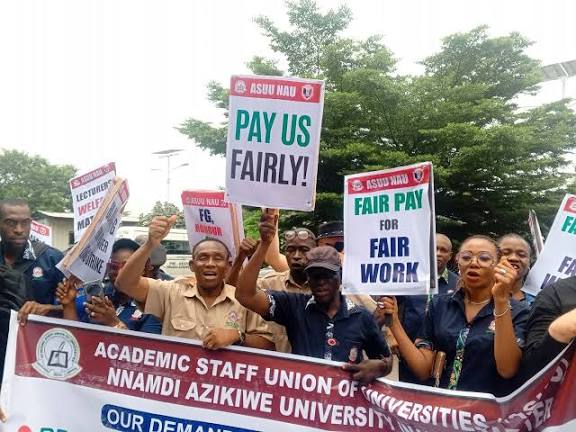Academic Staff Union of Universities (ASUU) has been a remarkable body in Nigeria’s educational landscape. The association gained notoriety for its recurring industrial resistance over the decades. At the heart of its struggles lies an agitation for the improvement of universities’ funding and poor remuneration of members by the government.
The last time the union attracted national attention was during the administration of the late President Muhammadu Buhari in 2022, when students sat at home for nothing less than eight months, a period that covers more than an academic session. During the intervals, the union and the federal government’s representatives met nearly every week to settle on favourable solutions, but all the meetings ended up without results until FG waged its supremacy through the mechanism of a court.
Today, the crack that led to the “indefinite and suffocating” eight-month strike, and the new ones created by it are still casting a serious threat on the minds of concerned individuals, especially anytime another threat of strike looms.
The Effects of ASUU Strike and ‘No Work, No Pay’ Policy
On Sunday, 12th October, ASUU directed its members to embark on a two–week warning strike, which is to take effect in the following day.
The wake of the ongoing strike has led to disruption of examinations in some universities, leaving trauma on students. Those affected schools included the Federal University Dutse, Jigawa State; the University of Jos, Plateau State; and the University of Benin, Edo State.

Countering the ASUU action, the Federal Government of Nigeria issued a strong directive to all federal universities to implement a “no work, no pay” policy against members of the Academic Staff Union of Universities (ASUU) participating in the ongoing nationwide strike.
The order was contained in a circular released on 13th October, 2025, which was signed and communicated by the Minister of Education, Dr Tunji Alausa. The document, which was formally addressed to the Head of the Civil Service, the Accountant–General of the Federation, and the National Universities Commission (NUC), expressed the government’s dissatisfaction over the ASUU’s decision to proceed with civil resistance amid ongoing negotiations.
The effects of the power struggles are damning, painting the Nigerian educational system as poor and incompetent on a global stage.
To Nigerians, ASUU strikes translate to students losing valuable academic time, parents and guardians bearing additional financial burdens, with the reputation of the country’s universities being subjected to criticism all over the world. This has pushed many students to abandon school, fueling the already volatile out-of-school crisis, while contributing to the growing concern of social vices and employment rates battling the country.
Globally, Nigeria universities were underrated compared to their African counterparts in countries where the presence of academic activities are stable like Kenya, Ghana, South Africa, among others.
The problem has posed a deathblow on the certificates being earned by Nigerian university graduates, with employers casting doubts on the competency of students graduated from schools plagued by disruptions.
FG’s Justification of ‘No Work, No Pay’ Policy

The Nigerian Minister of Education, Dr Tunji Alausa
Justifying the enforcement of such policy, the Federal Government invoked the existing labour laws against any worker who deserted duty during the course of the industrial action, with the Vice–Chancellor of each university being under obligation to provide the information of the erring members.
To ensure adherence, the NUC has been instructed to monitor compliance across all federal universities and submit a consolidated report to the Ministry of Education within seven days.
The current two-week warning strike set into motion by ASUU on Monday, stemmed from the longstanding unresolved disputes. Key issues include the implementation of the 2009 FGN-ASUU agreement, the release of withheld salaries, and sustainable funding for public universities.
While the government’s party maintained that it had addressed most of ASUU’s demands, it was further disclosed that the Federal Government was open to further dialogue to avert the strike.
The recent action represented the government’s decision during the eight-month indefinite and suffocating ASUU strike in 2022, when salaries were withheld.
While the government approved a partial waiver in 2023, release of the remaining four months withheld salaries, has been a central point of contention fueling the current industrial unrest.

